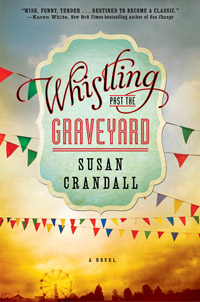Navigating Troubled Waters
Susan Crandall imagines an odd couple on a dangerous road trip through the racially divided South
In Susan Crandall’s Whistling Past the Graveyard, it’s July, and nine-year-old Starla Jane Claudelle is getting tired of being pushed around by her tyrant of a grandmother, Mamie. Starla’s mother, Lulu, ran off to Nashville to be a singing star when Starla was only three, and all Mamie cares about is raising her granddaughter to be a lady—unlike her daughter-in-law. Starla lives in Cayuga Springs with Mamie while her father, Porter, works on an oil rig in the Gulf of Mexico. Even at such a young age, Starla has a temper to go with her red hair and a tendency to leap before she looks.  As the book opens, she is looking forward to the Fourth of July festivities and doing her best not to “sass” her grandmother in hopes of avoiding “restriction.” When Mamie suggests at breakfast that they change her name from the one her mother gave her (“Starla makes people think of a trailer park, just sittin’ there waiting for the next tornado”) to the more cultured “Jane,” Starla tries to keep her eyes on the prize: “Fireworks. Fireworks. Remember the fireworks. I shoved the Frosted Flakes in my mouth to keep all the words spinning around in my head from shootin’ out.”
As the book opens, she is looking forward to the Fourth of July festivities and doing her best not to “sass” her grandmother in hopes of avoiding “restriction.” When Mamie suggests at breakfast that they change her name from the one her mother gave her (“Starla makes people think of a trailer park, just sittin’ there waiting for the next tornado”) to the more cultured “Jane,” Starla tries to keep her eyes on the prize: “Fireworks. Fireworks. Remember the fireworks. I shoved the Frosted Flakes in my mouth to keep all the words spinning around in my head from shootin’ out.”
It’s not long before those words and lots more besides come shooting out anyway. And after Starla breaks the nose of twelve-year-old Jimmy Sellers—the “turd of the century”—despite all her good intentions, Mamie grounds her. When she later sneaks out of the house to watch the parade, she is discovered by a nosy neighbor and makes a sudden decision to run away from home. Tired of all the secrets and the lies she has been told about her mother, she decides to travel to Nashville and find her. Starla imagines that “once I got to Nashville, I’d be able to love her right out loud.” She doesn’t get far in the sweltering heat before she is offered a ride by a mild-mannered young black woman named Eula, who has just picked up an infant abandoned on the steps of a local church. She has named the baby “James” and plans to take him home to her husband, Wallace, and raise him as their own. The only problem: it’s 1963, and James is white.
 Thus begins a strange odyssey that will challenge everything Starla and Eula believe about themselves and the people they love, and change their lives forever, if they manage to survive. Set against a backdrop of explosive civil-rights unrest, when even the most innocuous interaction between blacks and whites might erupt suddenly into violence, Whistling Past the Graveyard follows Starla and Eula from Cayuga Springs to Nashville with a few stops in between. Along the way they meet good Samaritans like the kind teacher, Miss Cyrena, who opens her home to them when Starla is sick with fever and offers her kitchen for Eula’s pie-baking business. But a number of angry strangers bent on acts of violence also cross their path. Crandall cuts the tension of the story’s more anxious moments by filtering them through the perspective of the precocious Starla, whose colorful turns of phrase are both whimsical and apt: her frequent bouts of temper are her “red rage”; when she gets nervous, she has “bees in her belly”; the reasoning behind her grandmother’s senseless rules is “one of Egypt’s mysteries”; summer weather is “hot as the hinges of Hades”; she fears she will be held in a locked room “till the devil served popsicles”; and a violent man is “too mean for God to care.”
Thus begins a strange odyssey that will challenge everything Starla and Eula believe about themselves and the people they love, and change their lives forever, if they manage to survive. Set against a backdrop of explosive civil-rights unrest, when even the most innocuous interaction between blacks and whites might erupt suddenly into violence, Whistling Past the Graveyard follows Starla and Eula from Cayuga Springs to Nashville with a few stops in between. Along the way they meet good Samaritans like the kind teacher, Miss Cyrena, who opens her home to them when Starla is sick with fever and offers her kitchen for Eula’s pie-baking business. But a number of angry strangers bent on acts of violence also cross their path. Crandall cuts the tension of the story’s more anxious moments by filtering them through the perspective of the precocious Starla, whose colorful turns of phrase are both whimsical and apt: her frequent bouts of temper are her “red rage”; when she gets nervous, she has “bees in her belly”; the reasoning behind her grandmother’s senseless rules is “one of Egypt’s mysteries”; summer weather is “hot as the hinges of Hades”; she fears she will be held in a locked room “till the devil served popsicles”; and a violent man is “too mean for God to care.”
Eula shares with Starla a simple faith in God, while Starla inspires Eula with her courage and her strong sense of justice. As she tells Eula, “My daddy says that when you do somethin’ to distract you from your worstest fears, it’s like whistlin’ past the graveyard. You know, making a racket to keep the scaredness and the ghosts away. He says that’s how we get by sometimes. But it’s not weak, like hidin’ . . . it’s strong. It means you are able to go on.” As they journey from a backwoods shack to the Ryman Auditorium and Tootsie’s Orchid Lounge, Starla and Eula learn to trust and depend on each other, calling to mind another odd couple by the names of Huck and Jim, as they “whistle” their way through a dangerous landscape into an uncertain future, one “graveyard” at a time.
Susan Crandall will appear at the Booksellers at Laurelwood in Memphis on July 12, 2013, at 6 p.m., and at Parnassus Books in Nashville on July 13, 2013, at 6:30 p.m. She will be joined at Parnassus by novelist Karen White.


